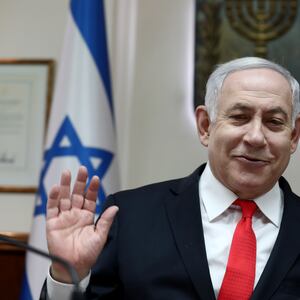JERUSALEM–Hours after Israel’s prime minister withdrew his request for parliamentary immunity from criminal prosecution early Tuesday, the State of Israel vs. Benjamin Netanyahu was filed at Jerusalem’s District Court, where it was assigned docket number 67104-01-20.
With that act, Israel’s Attorney General Avichai Mandelblit triggered an irreversible course leading to the trial of Netanyahu, who is Israel’s longest-serving prime minister, and the first to be indicted while in office. He stands accused of fraud, breach of trust, and bribery.
If convicted, Netanyahu could face about 10 years in jail.
The date for the first hearing in his case has yet to be announced, but is expected to be set for days or weeks after Israel’s election day on March 2.
Depending on the result of the vote, Israelis will decide whether Netanyahu, who failed to form a coalition government that would guarantee him immunity after elections held in April and September 2019, will stand before the three-judge panel as an indicted prime minister, caretaker prime minister, or former prime minister.
A previously untested law permits a sitting head of government to be indicted while remaining in office. Netanyahu was able to delay the formal court with his request for immunity from the Knesset, Israel’s parliament. Had that ploy been successful, court proceedings could not have begun until after the end of his term.
But Netanyahu, who is just a caretaker prime minister at the moment, and whose bloc of parties does not enjoy a Knesset majority, withdrew his request rather than face the humiliating prospect of a defeat. In the 2019 campaigns, he had promised he would never stop asking for parliamentary immunity. But in the predawn hours of Tuesday, he did.
At that moment, in fact, Netanyahu was in Washington, D.C., preparing to join President Donald Trump for the highly anticipated presentation of Trump’s plan for peace between Israelis and Palestinians. His evident political calculation is that what Trump has called “the deal of the century,” even as a nonstarter, will bring potent political benefits to his campaign.
After several years of police investigations that saw some of Netanyahu’s closest confidants turn state’s witnesses, Mandelblit indicted Netanyahu last November “with a heavy heart, but wholeheartedly.”
Case 4000, the most perilous for Netanyahu, involves his alleged bribery of former pal and businessman Shaul Elovitch, who was the principal shareholder of the Israeli telecoms giant Bezeq and its subsidiary, the Walla News site.
Netanyahu and Elovitch are alleged to have engaged in a quid pro pro in which Netanyahu, who then served as communication minister as well as prime minister, directed regulatory changes in a manner that helped Elovitch yield about $500 million in illicit proceeds.
In exchange, according to the indictment, Netanyahu and his wife, Sara, were permitted to control Walla News’ coverage so as to better their images and target their opponents.
"Netanyahu and Elovitch created a give-and-take relationship based on their mutual understanding that each of them had a significant interest that the other could advance,” Mandelblit announced last November.
Netanyahu vigorously denies all charges in all the cases presented against him, and denounced the indictments as “a civilian coup d'état aimed at toppling me and the right-wing government I lead.”
Case 2000 also touches on Netanyahu’s desire for more flattering media coverage, this time in a scheme that was never executed.
The accusations center on a series of encounters between Netanyahu and his ostensible nemesis, Arnon Mozes, the publisher of Israel’s widest distribution daily tabloid, Yediot Ahronot, which were both instigated and recorded by Netanyahu.
The indictment claims that in exchange for favorable coverage, Netanyahu would suppress circulation of Israel Hayom, a free daily that is considered a mouthpiece for the prime minister, which was founded by GOP and Netanyahu supporter Sheldon Adelson, the Las Vegas casino tycoon.
In Case 1000, Netanyahu is accused of accepting (and occasionally demanding) gifts from well-heeled acquaintances such as Israeli-born Hollywood mogul Arnon Milchan and Australian billionaire James Packer, who in turn allegedly asked Netanyahu to use the power of his office for personal benefit.
In details that have titillated Israelis for months, Netanyahu is alleged to have received expensive Cuban cigars and French pink Champagne, and to have permitted family members—wife Sara and son, Yair—to request and accept gifts as well.
Israelis awoke Tuesday morning to a Facebook post in which Netanyahu described his decision to forgo immunity as a sacrifice he was undertaking so as to advance Trump’s “historic” deal.
“I am withdrawing my request for immunity,” he announced, slamming the Knesset for running “a circus” and lashing out at the judiciary that “did not afford me due process.” Netanyahu said he was confident he would “squash the disproportionate charges contained in the vacant accusations filed in my case.”
But “for now,” he said, “I will not let my political opponents use this matter to interfere with the historical move I am leading.”
Netanyahu’s principal electoral rival, former Israeli Army Chief of Staff Benny Gantz, who heads a centrist party, responded while en route to Israel from Washington, D.C., where he too had met with Trump to discuss the peace plan.
“Netanyahu is going to trial,” Gantz tweeted. “Israeli citizens have a clear choice: a prime minister who will work for them or a prime minister involved with himself. No one can manage a state and simultaneously manage three serious criminal cases for bribery, fraud, and breach of trust.”







